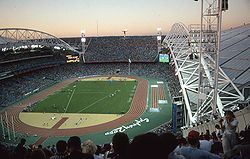Contents
- Background
- Qualification
- Competition format and course
- Records
- Schedule
- Results
- References
- External links
| Men's marathon at the Games of the XXVII Olympiad | ||||||||||
|---|---|---|---|---|---|---|---|---|---|---|
 Olympic Stadium | ||||||||||
| Venue | Stadium Australia, Sydney | |||||||||
| Date | 1 October | |||||||||
| Competitors | 100 from 65 nations | |||||||||
| Winning time | 2:10:11 | |||||||||
| Medalists | ||||||||||
| ||||||||||
| Athletics at the 2000 Summer Olympics | ||
|---|---|---|
| | ||
| Track events | ||
| 100 m | men | women |
| 200 m | men | women |
| 400 m | men | women |
| 800 m | men | women |
| 1500 m | men | women |
| 5000 m | men | women |
| 10,000 m | men | women |
| Sprint hurdles | men | women |
| 400 m hurdles | men | women |
| 3000 m steeplechase | men | |
| 4 × 100 m relay | men | women |
| 4 × 400 m relay | men | women |
| Road events | ||
| Marathon | men | women |
| 20 km walk | men | women |
| 50 km walk | men | |
| Field events | ||
| Long jump | men | women |
| Triple jump | men | women |
| High jump | men | women |
| Pole vault | men | women |
| Shot put | men | women |
| Discus throw | men | women |
| Javelin throw | men | women |
| Hammer throw | men | women |
| Combined events | ||
| Combined | men | women |
The men's marathon event at the 2000 Summer Olympics took place on 1 October 2000 in Sydney, Australia. [1] One hundred athletes from 65 nations competed. [2] The maximum number of athletes per nation had been set at 3 since the 1930 Olympic Congress. The event was won by Gezahegne Abera of Ethiopia, the nation's first victory in the event since winning three in a row from 1960 to 1968. Ethiopia's fourth gold medal in the men's marathon moved it out of a tie with France and the United States into sole possession of the most men's marathon gold medals. Ethiopia also became the first nation to have two medalists in the men's marathon in the same Games since South Africa did it in 1912, as Tesfaye Tola took bronze. Kenya won its third men's marathon medal in four Games with Erick Wainaina's silver. This made Wainaina the sixth man to earn two medals in the event, after his bronze in 1996.